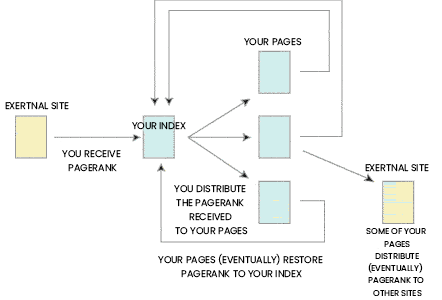Definition of PageRank
PageRank is an algorithm used by Google to measure the popularity of a website or web page. It was invented by Larry Page, co-founder of Google. But if PageRank is linked to a site’s reputation and its popularity with other sites and Internet users, what criteria are taken into account to say that one site is more popular than another?
How PageRank works
The PageRank algorithm is based in particular on links to a site. The more links there are pointing to a web page, the better it will be rated. But the PR (PageRank) score doesn’t just take this into account. Google’s algorithm also studies the quality of the sites that talk about a site and use these outgoing links. So the more people who talk about a site, the higher the PageRank. And if you want to know your PageRank index, there are several tools available to calculate it online, the best known being Google Bar.
In a nutshell…
Search engines consider that the interest in your site is directly proportional to its popularity, i.e. the number of links pointing to it. The more people talk about you, the more interesting you are and the higher your ranking. But that’s not all! The interest of the sites that talk about you is also taken into account: the more interesting the people who talk about you, the more interesting you are considered to be.

This “interest” is expressed in the form of a score (a number) known as the pagerank (PR).
The rest is just an interminable and fluctuating calculation, which tries to take into account all the sites on the planet, and which will distribute scores to some and others, taking into account the scores of some and others.
There are several tools you can use to find out your pagerank. The simplest and best known is undoubtedly the GoogleBar, which you can download free of charge from the Google website.
In the GoogleBar system, the PR is rated out of 10. The average for all the sites in the world is 5. If you get a PR of 3 to 4, and if the relevance of your site is optimized, you can already find yourself very well ranked in a large number of search results.
If your site deals with a specialized subject, and you are virtually the only person to talk about it, you can be ranked first even though your pagerank is 0 or 1.
Conversely, if your site is about sex, drugs or rock’n’roll (which are reputed to be the most overused subjects on the web) you will probably remain ranked on page 20 or 30, even if your PR reaches 8 or 9.
The importance of Pagerank in the rankings is diminishing every day in favor of other factors that are less easy to manipulate by clever webmasters.
Got an SEO question?
Géraldine can help
5 years of SEO expertise

In more detail…
To get to the bottom of the PageRank concept, you still need to understand a few finer points:
- The importance of page rank: PR is not (far from it) the only criterion that will determine your position in the search engine results. Don’t spend all your energy trying to increase it. Relevance is now the most important parameter for your ranking. PageRank is now only used as an additional parameter to separate pages with comparable relevance for a particular search.
- Backlinks and page rank: Each time a site adds a link pointing to your site, you recover part of its pagerank. However, this part is all the smaller, the greater the number of links on the page pointing to you. The PR you recover from the starting page is therefore divided by the total number of links it contains.
- Non-transmission of pagerank: If the link pointing to you contains the rel=”nofollow” attribute (this attribute can be specified in the link code) it will not earn you pagerank. The use of “meta” tags and the “robots.txt” file can also influence whether or not a link is followed by search engines.
- One pagerank per page: The PR of each of your pages is independent. The notion of pagerank applies to pages, not sites. However, if all your pages point to each other, they will redistribute the PR that each of them receives. Depending on the number and architecture of your internal links, certain pages on your site will benefit from a high pagerank to the detriment of other pages. This can be a disadvantage if you don’t master this logic, or an advantage if you know how to take advantage of it.
- Relevance and backlinks: The content of the sites that link to you also influences the relevance attributed to your site.
- Pagerank of backlinks: If you can choose, it’s better to have 10 links from sites ranked 5 than 100 links from sites ranked 2.
- Page rank scale: All SEO experts agree that the pagerank scale is logarithmic. This means that the more it increases, the more difficult it will be to increase it further. The precise way in which PR is calculated is one of Google’s secrets.
- Indexing and pagerank: The higher your pagerank, the more regularly search engines will check your site and your updates.
See also our article: How can I improve my PageRank?









